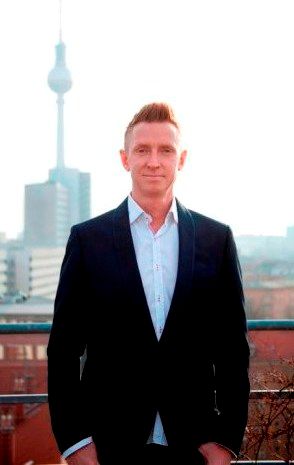Swede Henrik Tidefjärd is a globetrotter who has his fingers on the pulse of time when it comes to lifestyle and travel trends. He came to Berlin in 2001 to polish up on his German and stayed after falling deeply in love with the city and its people.
This year he celebrated the tenth anniversary of his agency, Berlinagenten, Berlin´s top agency for individual travelers and trend-oriented companies.
How did you come up with the idea to start your own business?
In 2002 I worked as a trainee for an advertising agency, but they didn´t give me a job afterwards as promised. In any case, I wanted to improve myself and start something new. One of my biggest passions is travelling and there are a lot of travelers like me who want to find the heart of a city right away without having to look around. Berlin is quite tricky because it doesn´t have a city centre like other cit-ies. These days, people are less likely to travel abroad for full two weeks as they might have done ten or twenty years ago. Instead, people today are more likely to take a trip for a long weekend. They don’t want to spend their precious days looking around in search for the buzz of a city. They want to be plugged into a scene as soon as they arrive.
Often, you can´t find any signs of bars and clubs here, everything is hidden. How are you supposed to find something, when you arrive in the middle of the city, at Alexander Platz, and it looks like a suburb? That´s why I thought; somebody has to be Mother Teresa for those poor individual travelers. Moreover the food scene was quite backwards in 2003, in comparison to other European cities. With this in mind I developed my first tour, a gourmet tour. The ‘Gastro Rallye’ is an overall experience. While you´re eating and enjoying yourself, you get an introduction to the lifestyle of Berlin. This was the beginning of my company – a story of success. It was never my intention to save the world, but to help high demanding travelers.
Your agency offers individual guided city tours with a focus on Ber-lin´s legendary lifestyle. What does it mean to you and how do you stay up-to-date?
I was really a pioneer when it comes to lifestyle tours. Ten years ago, nobody talked about lifestyle traveling. The programs that existed were really old fashioned, so German, so grey and not so colorful, without any lifestyle or trends. As time went by, I discovered that no one was offering tours around activities such as food, shopping, creative scenes, art scenes and Berlin by night.
I travel for three or four months a year around the world to discover new trends and developments. My clients are really high level and I have to know what they like and what they are talking about. That´s one of my strategies: I know what´s going on in the world and I´m not just focused on Berlin. I can´t sell Berlin as the coolest and best city in the world to a jetsetter or journalist from New York or Sao Paulo, who has been everywhere and seen everything. I have to be ob-jective. This is only possible if I know what´s going on in emerging cities like Sao Paulo, Tel Aviv, Moscow or Miami. You have to under-stand the client´s domestic scene in order to understand what prefer-ences they already have. If a client is looking for something he experienced in Hong Kong, then I will know easier what he wants if I have scanned that scene. That makes it possible for me to meet my client´s expectations and needs.
You market yourself towards high-end clients. With this in mind, how do you select your guides?
I always ask five questions to figure out whether a guide is a good fit or not. You have to reflect the city and the scene as a guide. That´s way I work mainly with freelancers instead of certified guides, because those who are certified are often stucked to a traditional guide pattern and believe that they have to talk about every church they encounter and every Prussian king, which could really put the clients to sleep. We work with the present; modern, edgy and personal stories. When I have a Turkish group my aim is to offer a Turkish “guide”, for example, so that there will be a connection between them right away. They can ask their guide how his or her life in Berlin is like.
My guides are very multifarious and work often in the creative scene. They don´t have ten or eleven tours a day, as they might have if they are generic guides who work like slaves for big agencies. Most of my guides have their profession within the film industry or in advertising, as artists, musicians or writers. That´s why they work with joy and can take their time with the clients. This brings a totally different kind of energy. The focus is always on the client. A jetsetter can change his or her mind at any time and as a lifestyle guide you have to conduct like you knew about this change. Until now, I have been lucky with the guides we have found. I don´t control them by taking part on their tours or test them in advance. I trust them and they really appreciate that. That is what is so special about Berlinagenten. Either you are a lifestyle guide or not and I can tell!
Berlin is constantly changing. What have been the most significant changes in your opinion?
The tipping point was the football World Cup in 2006. Since then, de-velopment has speeded up. The visitors to the World Cup discovered the world outside the stadium, and noticed that Berlin is not like they had imagined. What they discovered was an awesome city, awesome scene and party life. Germany didn’t have a good reputation before then. If you don’t travel that often, you have certain prejudices in mind. The only way to change them is to go abroad and sometimes; when the World Cup or other big events take place, you are forced to go to these places. That totally changed how Berlin was perceived and in 2008, it really started to work out. Since then, Berlin has had a large inflow of expats from all over the world, mostly of young people. The young people don´t want to go to Barcelona or London anymore like 10 years ago. They come to Berlin right away, although they can´t speak any German. That´s the big difference with other cities like Paris, Madrid or Rome. Berlin is one of the few cities where English succeeded as a communication language.
What is the newest trend and where goes the development?
I belong to the Prenzlauer Berg generation. Nowadays it is Neukölln, whereas Neukölln is a copy of Prenzlauer Berg with its bulk trash furniture and beer crates in my opinion. Innovation doesn´t have to be fancy, but it has to have that little extra. That´s Berlin too of course, but Berlin needs a more posh scene as well. This is the new big trend. Ravers from the 90s got settled, raised families and don´t want to sit on beer crates anymore. They established those new places like Grill Royal or Bartausend. We basically live off tourists here, it’s our largest source of income. That´s why we should cover all their needs. Since a couple of years ago, Berlin has something for everybody and becomes more and more like London, New York or Stockholm. High Society is the right cue. I always wondered where all those people come from, but Berlin needs them. Ten years ago Berlin was rough and grubby and it was hard to find a chic location. Now it’s more cosmopolitan and international but we still have a long way to go.
Any last words?
Berlin is my spirit, the world is my escape!
Interview: Skadi Borchert



No comments:
Post a Comment